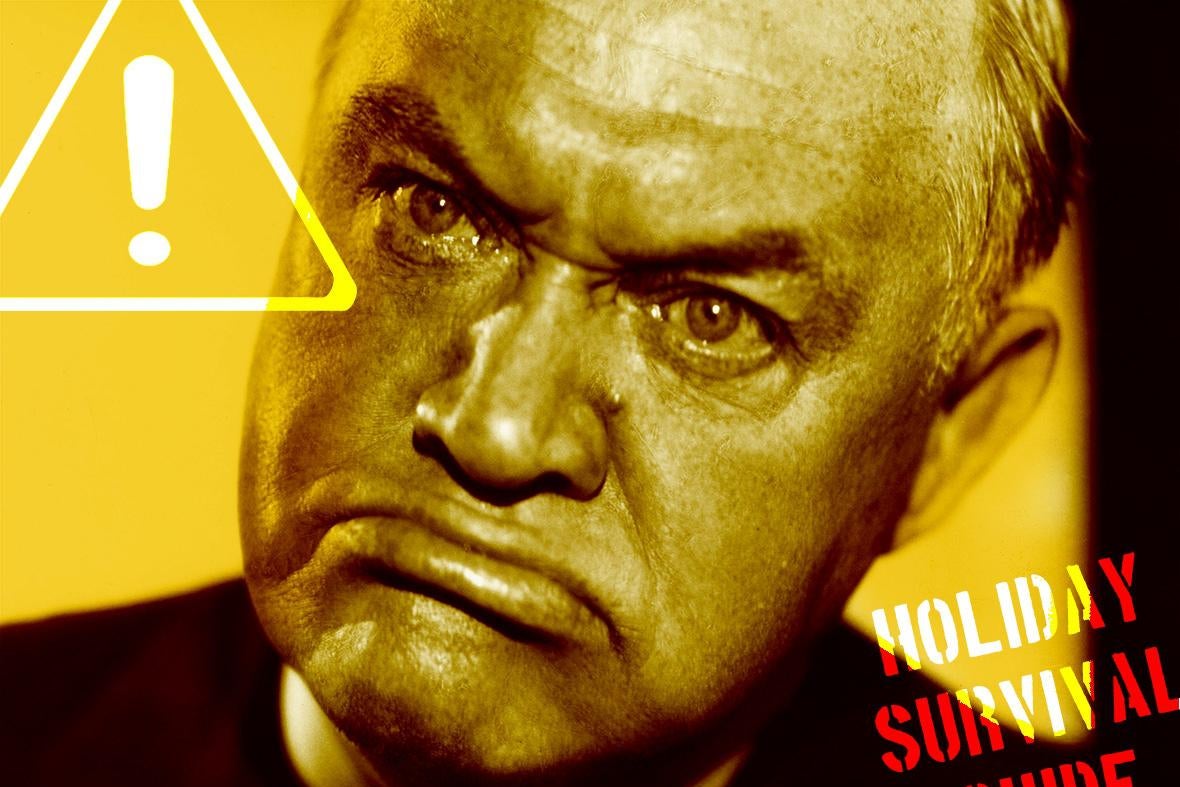I would like to devote some space to an institution much discussed this time of year. It will be girded for, it will be planned for, it will be strategized around, and, quite frankly, it’ll be a bit feared. I speak of the uncles. Is there any position that is freighted with more apprehension, especially around the holidays, than that of the uncle? Mother Nature Network blog: “How to Discuss Climate Change With Your Uncle During the Holidays.” ThinkProgress: “How to Talk to Your Tea Party Uncle About Obamacare This Thanksgiving.” L.A. Times: “What to Do If Your Crazy Right-Wing Uncle Comes for Thanksgiving.” And Slate has long run John Dickerson’s advice: “How to Distract Your Crazy Uncle Over Thanksgiving Dinner.”
Why does the uncle become the go-to shibboleth of all those who decry rudeness, racism, and any out-of-touch sentiment? No one ever worries about the aunt at Christmas—poor dear, she’s had to deal with uncle for so long. But the uncle slander persists, for a few reasons. One, no one primarily identifies as the uncle. If you’re an uncle, you probably play a bunch of other roles too: son, dad, Promise Keeper, Regan Republican, fantasy football aficionado, beer of the month club pioneer, etc. So you’re not going to be raising your hand and saying, “Actually, I am an uncle.” Two, there’s a question of math: I think there are fewer uncles than there used to be. They’re less potent as a demographic. The United States population is increasing, and yet family size is shrinking. So if you have more people, but fewer people in every family, you have fewer uncles than we used to have—and those remaining are easier to pick on. Three, they attract the bulk of the scorn that could go to other family members—it’s the flypaper theory of unclehood. Given that your uncle’s sibling, or sibling-in-law, is your parent, we can surmise that your parent and your uncle are probably a lot alike. Same general age cohort, very similar upbringings, yet why is the uncle so decried but the parent skates by on all serious criticism? Oh sure, people talk about Dad jokes or Mom jeans, but uncles aren’t merely out of touch on issues of style—they still use terms like Orientals.
OK, that explains where the intolerant uncle trope comes from, but what should you do when you actually run into one? (And you will, because what we’re really talking about here is progressive nieces and nephews encountering the conservative half of the country around the holiday table.)
First of all, have some empathy. My theory is that a high percent of uncles have little contact with younger generations. Some uncles are childless, whereas no Moms and Dads are, and exposure to a younger generation has a moderating influence on one’s beliefs or expression of said beliefs. So it may not be his fault that he doesn’t know all the best new phrases for referring to people of demographics other than his own.
Secondly, it would help to reimagine your duty once your uncle pops off. When an uncle transgresses, we jump on him. We throw him under the bus, or other modes of transport—I call it the avuncular funicular effect. But when a parent engages in garden-variety xenophobia, or expresses pro-Trump sympathies, we might cringe but then say “Oh, that’s just Dad.” When it comes to our parents we’re generally kinder, more forgiving, or perhaps just blinder, purely as a defense mechanism. But if you were to treat an uncle, not as a part-time interloper but with the deference one would give a parent, you might make some progress.
Instead of “into the breach,” try uncle outreach. Take whatever dismissive comment you might lob at your uncle and recast it as an opportunity to marvel aloud at how his philosophy is so starkly different from what you usually hear in your acquaintance circle. Bond with him over political incorrectness; find an example of political correctness that you find risible. Instead of rebutting or disagreeing, you might wish to cast counter arguments with interest. “Now let me ask you, Uncle: Whenever someone says that a good guy with a gun is the only thing that stops a Muslim climate alarmist gay rights agitator with a gun, there are some standard counter arguments. I’d be interested to hear what you’d say to the fact that (and here you offer the best argument that Rachel Maddow puts forth, but you do so nicely).
Third, I’d ask your uncle for him to educate you on something he actually knows about. This will place him but also obviate his need to dominate discussions of areas he clearly knows less about, such as if Caitlyn Jenner counts as “brave” or Which Lives Matter. These simple steps will placate your uncle, please your parents, and soothe you. And it will serve you well even away from the holiday table, because if you take into account the current exultation of the blustery, nativist, scornful, cocksure man as an archetype … we are becoming a nation of uncles.
This post is adapted from a recent segment of Mike Pesca’s podcast, The Gist.
